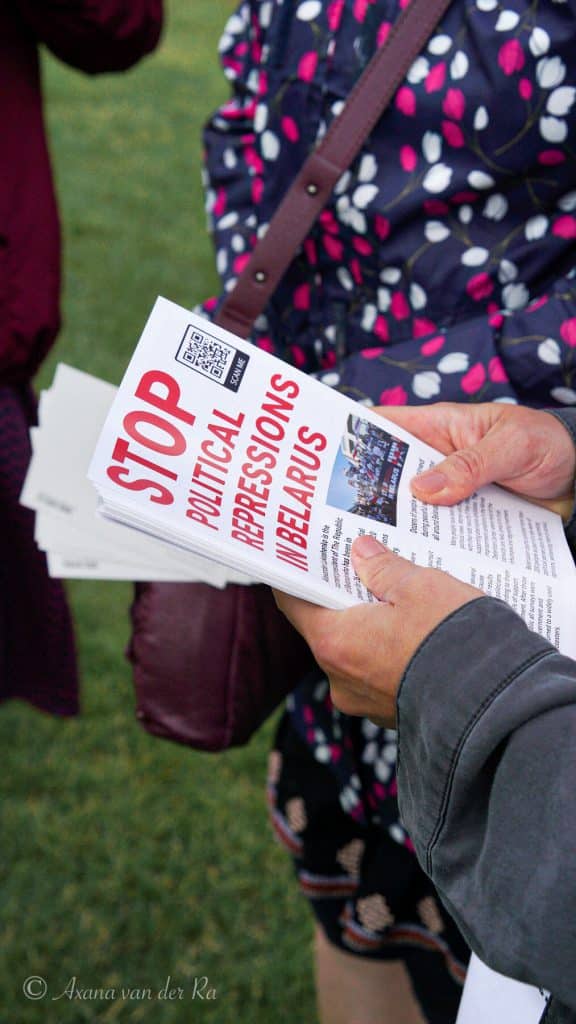In the Republic of Belarus (Belarus), there have been protests for weeks against President Alexandr Lukashenko, who has been in power for 26 years. Democratic freedoms and values are not in his vocabulary. So far, more than 300 people, including one of his most promising challenger, Viktor Babariko, have been arrested during protests against the detention and exclusion of opposition candidates. These candidates were excluded during the presidential election on 9 August. Partly due to Lukashenko's corona policy and approach towards opposition candidates, activists, journalists, bloggers and vloggers, his support is rapidly crumbling. With a heavy hand, the president is trying to maintain his power.
No corona policy, drink vodka
This is not the first time there have been protests in Belarus. In previous elections, the tension came only after the election results where people furiously took to the streets to protest election fraud. Even then, riot police took violent action and protesters abandoned it after a few days. But these protests and elections are fundamentally different.
Besides the harsh economic conditions, Lukashenko's corona policy seems to have been one of the last straw. The government's lax handling of the corona crisis has put the health of thousands of citizens at risk. Initially, the president downplayed the seriousness of the virus - for instance, he dismissed the corona virus as a "psychosis" best combated by drinking vodka. Consequently, on 9 May, he allowed the victory parade with 3,000 soldiers and more than 10,000 spectators to go ahead. As a result, the virus spread rapidly. According to (disputed) figures, Belarus now has almost 67,000 confirmed infections but only 530 deaths.
Svetlana Tikhanovskaya leaves Lukashenko Spanish-stricken
On 14 July, the Belarusian Central Election Commission registered five candidates for the presidential election, including, of course, Lukashenko. Other candidates who had secured the required 100,000 signatures were completely barred from participating by the electoral commission. Svetlana Tikhanovskaya still managed to register after her husband, popular blogger Siarhei Tsikhanouski, was barred from participating and has since been arrested. Veranika Tsapkala and Maryya Kalesnikava represent two other high-profile candidates: the former ambassador to the US, Valeri Tsepkalo and Viktor Babariko, Banker and former head of Russia's Belgazaprombank. Both men were removed from the race by the Lukashenko and have been detained for several weeks on suspicion of fraud and money laundering.
However, the race for Lukashenko does not seem to be over yet. Tikhanovskaya is now the new figurehead in the fight against the authoritarian president. The two wives of the imprisoned opposition leaders have decided to join forces and fully support Tikhanovskaya. But together, are they strong enough to win the election?
Initially, Svetlana Tikhanovskaya, a 37-year-old teacher, linguist and mother of two did not plan to run for president. But out of love for her country and husband, she decided to enter the fray. On Sunday afternoon, 19 July, the three women managed to gather around 7,500 people for a political rally ahead of the presidential election. Entire families came to the meeting, which took place in a suburb of Minsk. There was no coverage of the opposition rally in the state media, nevertheless the crowd flocked en masse. "We have the right to speak, we have the right to a better life," Tikhanovskaya said. After which people applauded enthusiastically.
She has therefore made versatile use of the right to speak out. One of her main campaign themes is the release of all political prisoners. If she wins, she promises new, fair elections with all candidates not admitted to the fray. In addition, these elections are also about 'the female factor', as previously it was unthinkable to allow a woman to enter the fray. Unfortunately, things are not going without a hitch for her. Last week, she was forced to take her children abroad to safety because the regime had allegedly threatened to take them away from her. Despite this, Tikhanovskaya remains militant and has activated tens of thousands of Belarusians.
End in sight?
President Lukashenko feels his dictatorial rule is at risk as his popular support is rapidly eroding. According to a poll by an independent media outlet, Lukashenko has only 3% of support. This is not exactly much for a president who determines the content of all TV channels and newspapers. The text 'Sasha 3%' is currently popping up all over Belarus, sometimes with the president's moustache added to ridicule him. In addition, relations with big brother Russia are also on edge. For instance, Belarus and Russia had fights over oil. And Putin and Lukashenko had far-reaching plans to make Belarus part of Russia. Lukashenko opposed this. Currently, he also receives a lot of criticism from the EU for violating human rights, refusing access to foreign media and independent election observers, making EU sanctions seem inevitable. No sooner had "Europe's last dictator" stood so alone.
By: Remy van Aanholt
Photo: Axana van der Ra





